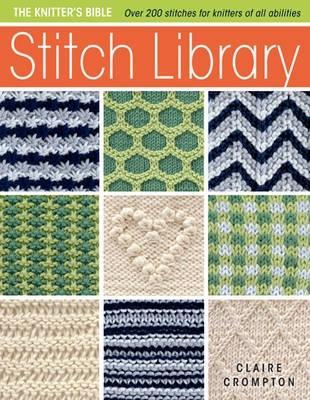Knitter's Bible
1 total work
Unleash your creativity with 200 versatile and innovative knitting stitches, plus projects and techniques from the author of the bestselling The Knitter’s Bible, with over 125,000 copies sold worldwide. A comprehensive collection of knitting stitches, ranging from the very simple to the new and innovative. Use Stitch Library as a guide to making your own unique knitted pieces, whether you are creating beautiful garments, useful accessories or stylish adornments for your home.
The Stitch Library chapter begins with simple but effective knit and purl stitches that add subtle texture to a plain garment. These include traditional Gansey (or Guernsey) patterns, with advice on how to use them to design your own classic sweaters. Using texture stitches, cable panels and fabrics, and embossed fabrics, you can make up more tactile and three-dimensional pieces. Elegant colour patterns can be created using slip stitches, dip stitches and stripes. For openwork pieces, you will find lace stitches and panels, together with eyelets and drop stitch patterns. Use the range of edgings and borders to give an individual touch to your next knitted garment or to personalize your ready-made clothing by adding a knitted trim.
The projects section will give you a range of ideas about how to use the stitches, with suggestions for designing your own versions. Use the projects to inspire you; the Cable Throw could just as easily be worked in panels of lace or texture stitches. The Making Waves scarf shows how a simple wave stitch can be worked in two yarns for a stunning effect. From a colourful patchwork cushion to a cashmere four-piece set and a pretty, feminine lace bag, there is a variety of creative projects.
It’s All in the Details chapter takes your through the basics of knit and purl stitch, how to cast on and bind off, increasing and decreasing stitches and more, so it is worth reading this before you pick up your needles to begin. Each stitch has full instructions and a clear stitch chart where appropriate, making it easier to see how to work each row. Use the charts together with the keys, along with advice on how to use the charts.
Experiment with the stitches, try something new, mix them up and create your own style.
The Stitch Library chapter begins with simple but effective knit and purl stitches that add subtle texture to a plain garment. These include traditional Gansey (or Guernsey) patterns, with advice on how to use them to design your own classic sweaters. Using texture stitches, cable panels and fabrics, and embossed fabrics, you can make up more tactile and three-dimensional pieces. Elegant colour patterns can be created using slip stitches, dip stitches and stripes. For openwork pieces, you will find lace stitches and panels, together with eyelets and drop stitch patterns. Use the range of edgings and borders to give an individual touch to your next knitted garment or to personalize your ready-made clothing by adding a knitted trim.
The projects section will give you a range of ideas about how to use the stitches, with suggestions for designing your own versions. Use the projects to inspire you; the Cable Throw could just as easily be worked in panels of lace or texture stitches. The Making Waves scarf shows how a simple wave stitch can be worked in two yarns for a stunning effect. From a colourful patchwork cushion to a cashmere four-piece set and a pretty, feminine lace bag, there is a variety of creative projects.
It’s All in the Details chapter takes your through the basics of knit and purl stitch, how to cast on and bind off, increasing and decreasing stitches and more, so it is worth reading this before you pick up your needles to begin. Each stitch has full instructions and a clear stitch chart where appropriate, making it easier to see how to work each row. Use the charts together with the keys, along with advice on how to use the charts.
Experiment with the stitches, try something new, mix them up and create your own style.
